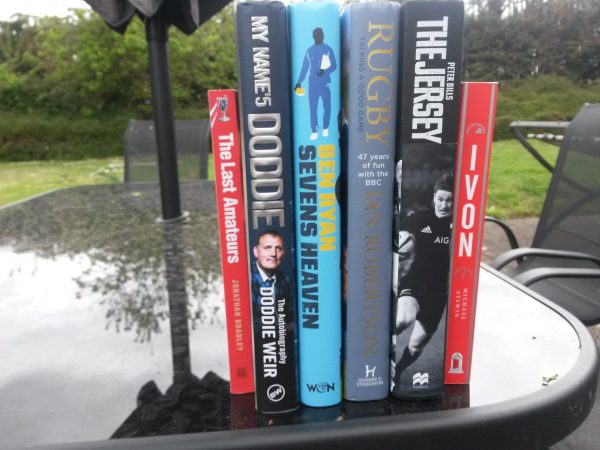The shortlists for the Telegraph Sports Book Awards were announced this week. Rugby World looks at the six contenders for the Heineken Rugby Book of the Year prize
The contenders for Rugby Book of the Year
Launched in 2003, the annual Sports Book Awards showcase the cream of sports writing and publishing. The Best Rugby Book category came on board in 2008 and is judged by a panel of journalists from the Rugby Union Writers’ Club. Two England No 8s of different eras, Andy Ripley and Billy Vunipola, sandwich nine other winners representing outstanding rugby writing from across England, Wales, Scotland and Ireland.
This year’s rugby shortlist was announced in Marylebone this week and is drawn from books published in 2018. In attendance were nominee Ian Robertson, past winner Brian Moore and Test referee Wayne Barnes, along with Mick Cleary and Gavin Mairs from the title sponsors. The awards ceremony takes place on 4 June at Lord’s. We sum up the contenders for the Heineken Rugby Book of the Year, listed in alphabetical order…
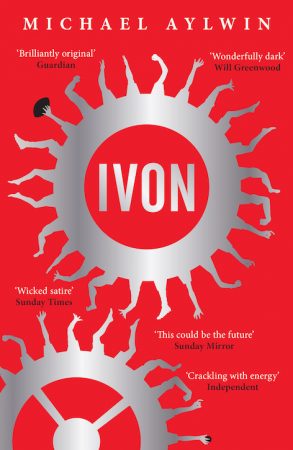
Ivon, by Michael Aylwin, published by Red Door, RRP £8.99
Michael Aylwin, who ghosted Richard Parks’s 2015 prize winner about the 737 Challenge, is back with surely the most imaginative book ever to feature on the rugby shortlist.
His novel is a futuristic humdinger set in the 22nd century in which sinister forces have made rugby (and other sports) unrecognisable from the game we know and love today.
Ivon is the hero of the story, a brilliant young outside-half taken under the wing of a legendary cricketer (Dusty Noble), who is perturbed by the society around him and starts to ask awkward questions of an increasingly nervous state.
There is humour, thought-provoking conflicts – notably humanity v science – and even a sprinkling of love interest. It’s like a cross between 1984 and The Hunger Games but with rugby thrown in, and how marvellous that a book that came to fruition because of crowdfunding can jostle with the major publishers at the Sports Book Awards.
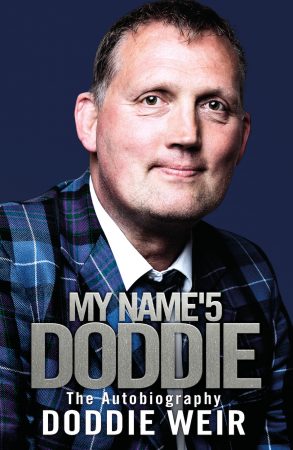
My Name’5 Doddie Weir: The Autobiography, published by Black & White, £20
A fitting addition to the shortlist, not least because Doddie Weir’s foundation – which has raised more than £2m for research into motor neurone disease since its launch 18 months ago – is this year’s charity partner of the Sports Book Awards.
The former Scotland lock writes movingly about the chilling and incurable disease that he was diagnosed with just before Christmas 2016. Typical of this much-loved personality, he has always been more concerned of his plight’s impact on others and that comes across in a book that nevertheless oozes gentle humour throughout.
Born into farming stock in the Scottish Borders in 1970, Weir went on to experience numerous high points in rugby, including a triumphant Lions tour, a Premiership title with Newcastle and a Scotland Five Nations title, all within a couple of years in the late Nineties.
The book brings a first rugby shortlisting for Black & White Publishing, a decade after the back-to-back successes of another Edinburgh publisher, Mainstream (now defunct).
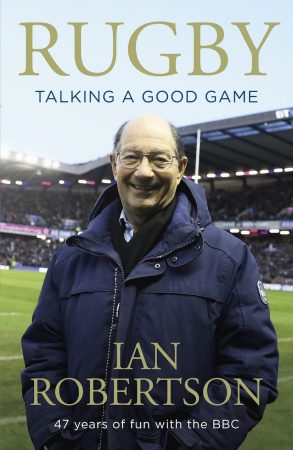
Rugby: Talking a Good Game, by Ian Robertson, published by Hodder & Stoughton, £20
Ian Robertson never played with Weir but he commentated on him many a time. Then again, whose path didn’t he cross during a near 50-year career working for BBC radio?
His autobiography, expertly ghosted by Chris Hewett, is a treasure trove of anecdotes and funny stories. But it’s much more that.
The ex-Scotland fly-half offers insights into many of the great broadcasters and sports personalities he encountered, from rugby coaches Ian McGeechan, Jack Rowell and Clive Woodward to media giants like Des Lynam, Peter Bromley and Bill McLaren.
He reported on pretty much every major rugby event in the past five decades and his gift of the gab won him friends in high places. Which is why he got invited to lunch by Nelson Mandela, was sent Christmas cards by Elizabeth Taylor and had George Best pulling up a chair to chat to him in a Canberra hotel.
RUGBY BOOK OF THE YEAR WINNERS
2008 Ripley’s World – Andy Ripley (Mainstream)
2009 Seeing Red: Twelve Tumultuous Years in Welsh Rugby – Alun Carter and Nick Bishop (Mainstream)
2010 Confessions of a Rugby Mercenary – John Daniell (Ebury Press)
2011 The Grudge – Tom English (Yellow Jersey)
2012 Higgy – Alastair Hignell (Bloomsbury)
2013 The Final Whistle: The Great War in Fifteen Players – Stephen Cooper (History Press)
2014 City Centre – Simon Halliday (Matador)
2015 Beyond The Horizon – Richard Parks (Sphere)
2016 No Borders: Playing Rugby for Ireland – Tom English (Arena Sport)
2017 The Battle – Paul O’Connell (Penguin Ireland)
2018 Wrecking Ball – Billy Vunipola (Headline)
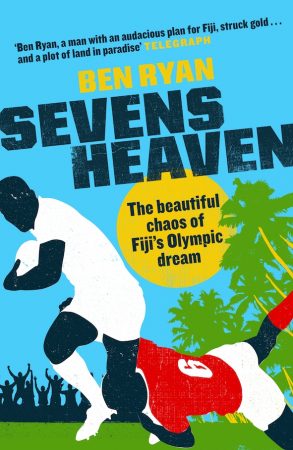
Sevens Heaven, by Ben Ryan, published by Weidenfeld & Nicolson, £20
Ben Ryan’s enthralling snapshot of life with Fiji Sevens came out about a year ago and ironically he was on stage at Lord’s to present the 2018 rugby prize, little knowing that his own book would be nominated this year.
The Londoner took charge of the flamboyant Fijians in 2013, shortly after his tenure as England Sevens coach fizzled out disappointingly, and the “three years of enlightenment” that followed in the South Pacific is brought to print with the help of the estimable BBC writer Tom Fordyce.
Ryan sheds light on the traditional ways and customs of Fijian life – many of them an impediment to a professional sports environment – and his patience and good sense brings a measure of structure to the chaotic brilliance around him.
The result is back-to-back World Series titles and a gold medal in the 2016 Rio Olympics – Fiji’s first Olympic medal of any kind.
Interestingly, Ryan delves too into more personal areas of his life, including an agonizing search for a long-lost childhood friend. It’s a book that ticks an awful lot of boxes.
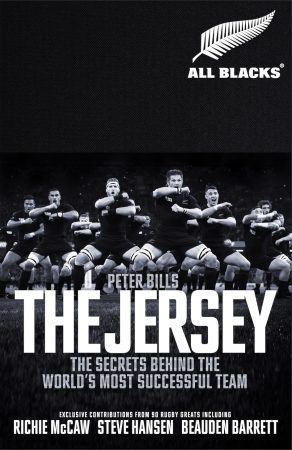
The Jersey, by Peter Bills, published by Macmillan, £25
Why are the All Blacks, hailing from a nation of fewer than 5m people, so damn good at rugby? Year after year after year.
It’s a question Peter Bills wanted to answer and after spending five months travelling round New Zealand, he certainly came up some answers. His splendidly comprehensive examination of the subject starts with the pioneering spirit of the first European settlers in 1839 and takes us right up to the barefoot Beauden Barrett and the team-driven environment currently overseen by Steve Hansen.
Some of the reasons given for New Zealand’s global dominance will be familiar to the reader – such as central contracts, coaching standards, and the heavy emphasis on basic skills and attacking intent that pervades every level of the game there.
Yet there are many other factors thrown into the pot, with plenty of outside opinion and Bills too getting on his soapbox, happy to criticise as well as laud.
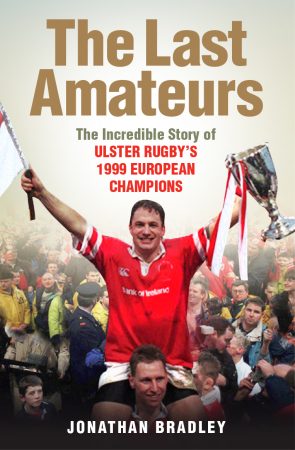
The Last Amateurs, by Jonathan Bradley, published by Blackstaff, £9.99
Crossing the Irish Sea, we have a terrific offering from Blackstaff Press via the hand of Belfast Telegraph rugby correspondent Jonathan Bradley.
Bradley takes us back to the early days of the Heineken Cup when not everyone was fully professional and you could have fledgling full-time rugby pros waiting for part-time team-mates to finish a day’s work at the office, farm or factory floor.
Ulster were in just that situation at the start of the 1998-99 season but contrived, under coach Harry Williams, to pull off the competition’s unlikeliest ever triumph.
A late interception try here, a missed opposition kick there, everything seemed to fall Ulster’s way. However, they still had to dispatch some mightily impressive French sides – English clubs had boycotted the tournament – to achieve their fairytale.
Follow Rugby World on Facebook, Twitter and Instagram.





